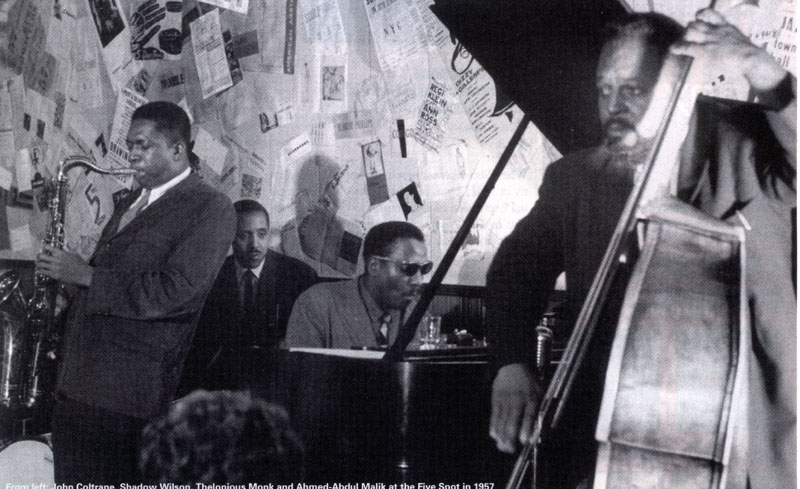

The best CD of this year is a piece of ancient lore from 1957 that will become one of the CDs that every jazz fan must have. The best of the year? Beyond any doubt. "Top Ten" material? Also certain. Desert island disk? Yes, for sure. The best jazz hour ever recorded? Quite possibly.
From July to December of 1957, Thelonious Monk led a quartet at a club in New York's Bowery called the Five Spot - in Ira Gitler's words, "an elemental place." Shadow Wilson was the drummer and Wilbur Ware began on bass, to be replaced by Ahmed Abdul-Malik. What made the quartet most remarkable was the presence of John Coltrane on tenor. Monk had at last had his cabaret license, which had been lifted on a probably trumped up drug charge, renewed, and was able to play in public for the first time in many years. Coltrane had kicked the very real drug habit that got him fired from the Miles Davis quintet and was on the verge of becoming one of the great innovators of jazz. The stage was set for something remarkable, and even at the time folks knew it - though to be sure, there were doubts that Coltrane would be up to the challenge - or would even stay clean (he was, and he did). Except for one or two bootleg tapes, the quartet was never recorded live - or so it was thought. There were a few studio dates from early in the five-month run, and a track from a reunion about a year later, but the former are not representative - Coltrane is tentative and, to be honest, not yet up to the task of being out front in such a demanding musical venue. The world was happy to have these tracks, but always mindful that the reality of what was going on night after night at the Five Spot had been lost forever.
Then 51 minutes, nine tracks of eight Monk tunes and a standard - Sweet and Lovely - so often played by Monk that it virtually became a Monk tune, were discovered by Larry Appelbaum in the Voice of America archives. They document Monk's portion of a November 29, 1957 Carnegie Hall benefit concert, and come from a time when the quartet had reached equilibrium and was in full, brilliant voice. There is nothing else like it. It is not like finding another Beethoven piece or Hemingway story - we have lots of those already. Those discoveries would be wonderful, but would not change the way we think about Beethoven or Hemingway. It is as if a new Vermeer were found. It's that important and that good. This CD makes that kind of impact - it adds something to our experience that we had only hints and memories of before.
For once, all the hype is justified - or exceeded. The quartet's playing is exemplary: tight, confident, exploratory. Even though it is an old concert date, the music is very well recorded and the sound is excellent and immediate - it doesn't sound like a concert, it sounds like a club date - or a JazzNights living room! Monk gets to play a great piano, hardly his usual fare at the Five Spot, and must have been delighted at the prospect. Coltrane has not only adjusted to the master, but has absorbed Monk in the manner of a brilliant student who is just about to go on to find his own real voice and his own radiance. One can hear hints - touches - of the Coltrane to come, but here he is steeped in Monk. Monk himself is hardly a passive partner or unaware of his partner's talent. Coltrane has clearly influenced his thinking and his playing. By this time, the relationship has become a true partnership. There are trane-like runs, trills, and arabesques aplenty from Monk, though he never loses his identity - he's always Monk, playing those great fragmented melodies, filled with unplayed but implied notes, open spaces, and magnificent harmonic leaps.
The opening duet - Shadow and Ahmet lay out - is as striking a musical piece as you will ever hear. It is surely an unusual opening number - a glacially slow, languid "Monk's Mood." There are no real solos, the two play together throughout after a short Monk intro, and the whole piece becomes a powerful and affecting statement by two of jazz' greatest artists. I'll not go through the list of tunes, there is nothing weak or routine here - perhaps the second set is looser - but it's all great.
A suggestion: Give this music a chance to dominate. It's not background music - it is just much too good. Find an hour all alone, maybe in the dark, when it can speak to you. It will, and it has a lot to say. And it is alright to speak back. If you can get through this version of "Blue Monk" without a shout or two, better check your pulse. Turn the music up loud, and imagine yourself back in the Five Spot, Monk in his hat, rising from the piano to do his little dances as solid, stolid Abdul-Malik solos, Shadow dings on the cymbals, and the musical world is changed forever.
A. G. Zaire